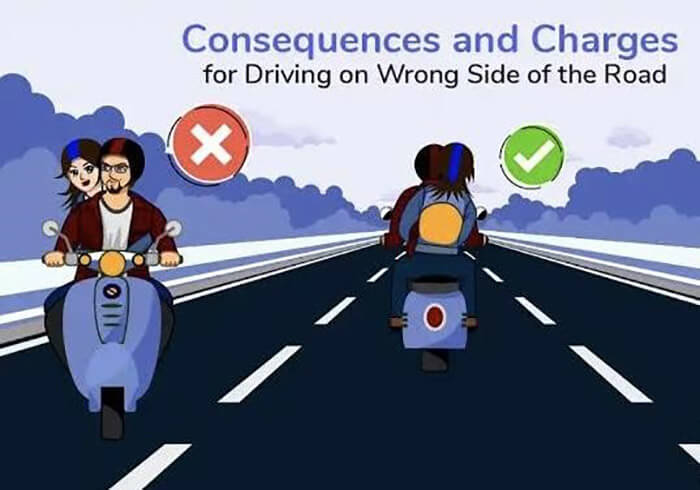
Introduction
Wrong-side driving, or driving against the designated traffic flow, is a serious traffic violation that poses significant risks to road safety. In India, where road accidents are a major cause of fatalities, wrong-side driving is a pressing concern. This article examines the legal implications of wrong-side driving in India, compares them with regulations in other countries, and highlights the need for stricter enforcement and awareness.
Legal Framework in India
Wrong-side driving is punishable under several provisions of Indian law, primarily governed by the Motor Vehicles Act, 1988, and various state-specific traffic regulations. The key legal provisions include:
Section 184: Dangerous driving, which includes wrong-side driving, can lead to a fine of up to ?5,000 and/or imprisonment of up to one year for a first offense.
Section 177: General penalties for violating traffic rules, including driving on the wrong side, attract a fine of ?500 for the first offense and ?1,500 for subsequent offenses.
Many states impose additional fines and penalties. For example, in Delhi, a penalty of ?5,000 is levied for wrong-side driving.
Some states have introduced stricter measures, including impounding vehicles for repeated violations.
If wrong-side driving results in an accident causing injury or death, the driver may face charges under the Indian Penal Code (IPC):
Section 279 (Rash and negligent driving) – Punishable with imprisonment up to six months or a fine of ?1,000.
Section 304A (Causing death by negligence) – Punishable with imprisonment up to two years or a fine, or both.
Comparison with Other Countries
United Kingdom
Wrong-side driving is treated as a serious offense under the Road Traffic Act, 1988.
Penalties include fines up to £5,000, license disqualification, and imprisonment for reckless driving.
In case of fatalities, the driver may be charged with death by dangerous driving, carrying a maximum sentence of 14 years in prison.
United States
The penalty varies by state but generally includes hefty fines, license suspension, and potential imprisonment.
In states like California, wrong-way driving can lead to a misdemeanor or felony charge if it results in an accident.
Enhanced penalties apply if the driver is under the influence of alcohol or drugs.
Singapore
Strict traffic laws impose fines of up to SGD 2,000 for first-time wrong-side driving offenses.
Repeat offenders may face jail time of up to 12 months and revocation of their driving license.
The country's de-merit point system can lead to immediate license suspension for severe violations.
Germany
Germany has a well-enforced traffic system where wrong-side driving (Geisterfahrer cases) is taken very seriously.
Fines start at €75 but increase substantially if the offense causes danger or accidents.
Reckless drivers may lose their license and face imprisonment under Section 315c of the German Criminal Code.
Need for Stricter Enforcement in India
Despite the existing laws, enforcement remains a challenge in India due to:
Lack of awareness: Many drivers, including two-wheeler riders, ignore traffic rules due to poor education on road safety.
Weak enforcement: Bribery and lack of strict policing lead to frequent violations without consequences.
Inadequate road infrastructure: Poorly planned roads and unclear signage contribute to wrong-side driving.
Recommendations for Improvement
Stricter penalties: Increasing fines and introducing license suspension for repeat offenders.
Technology-driven enforcement: Expanding the use of CCTV cameras and AI-driven traffic monitoring.
Public awareness campaigns: Educating drivers about the dangers of wrong-side driving.
Stronger legal provisions: Enhancing IPC provisions to include harsher punishments for reckless driving leading to fatalities.
Conclusion
Wrong-side driving is a dangerous offense with severe legal implications in India and other countries. While India has laws in place, effective enforcement and stricter penalties are needed to curb this menace. Learning from global best practices can help improve road safety and reduce traffic-related fatalities in the country.
By Manmeet Kaur
4th Year, B.A.LL.B
Ideal Institute Of Management And Technology (Affiliated to GGSIP University, New Delhi) fake watches
N-55, Sri Niwas Puri, New Delhi 110065
ireneslegal9@gmail.com
+91 995 378 5058
Copyright © ireneslegal.com. All Rights Reserved.
Designed by Questend India Pvt Ltd